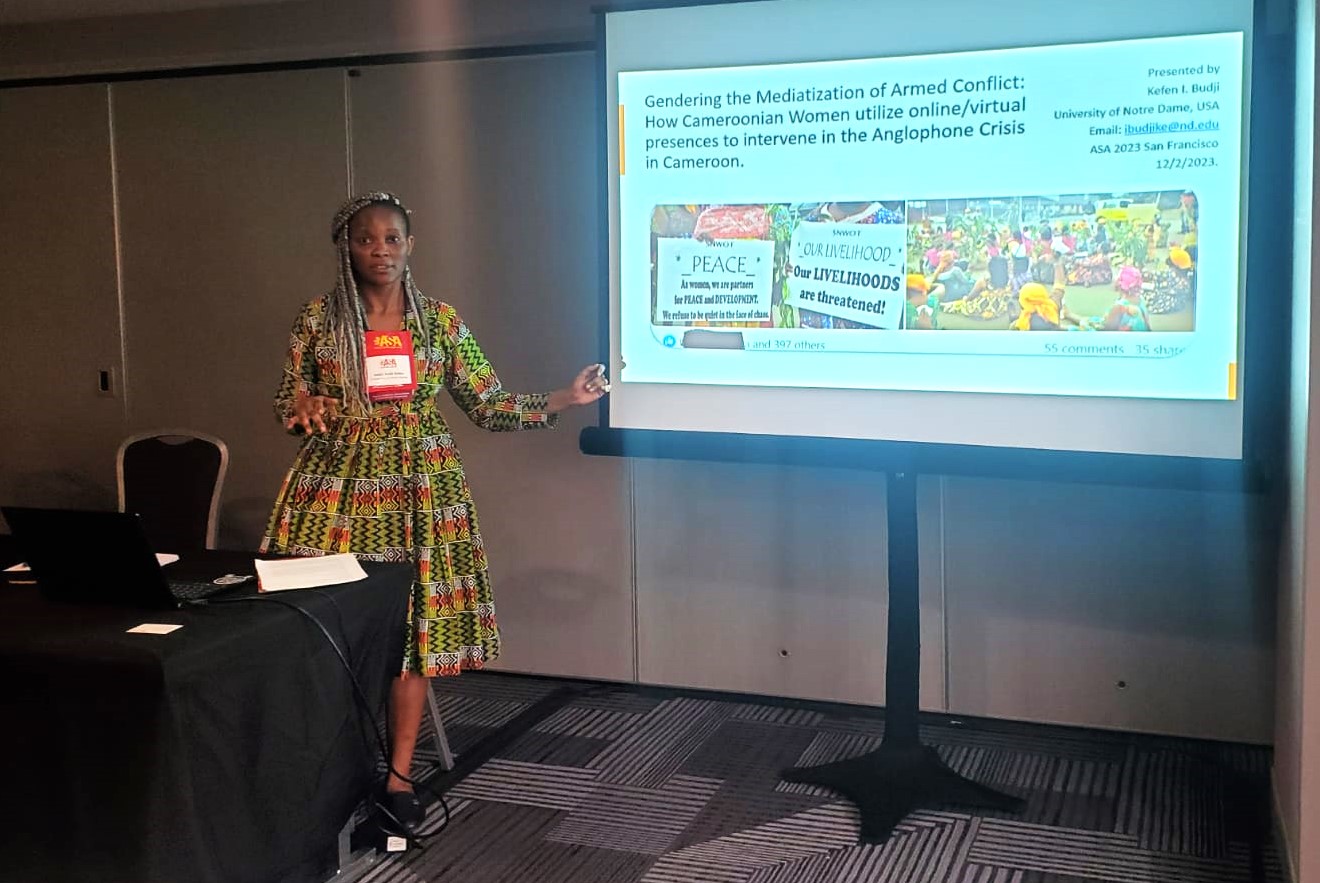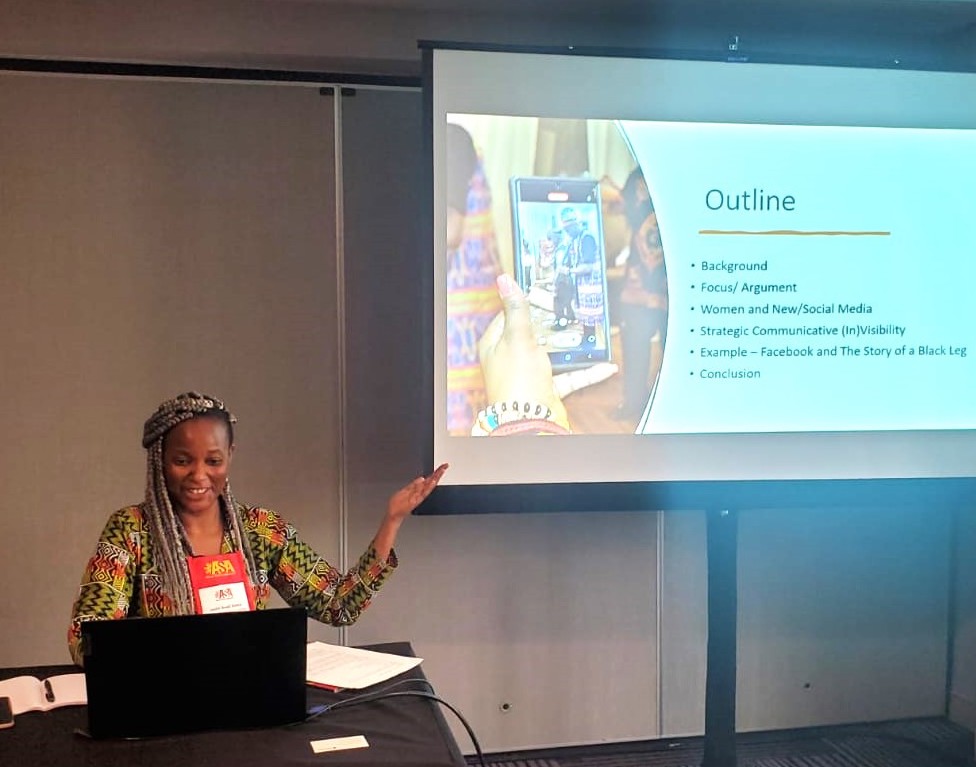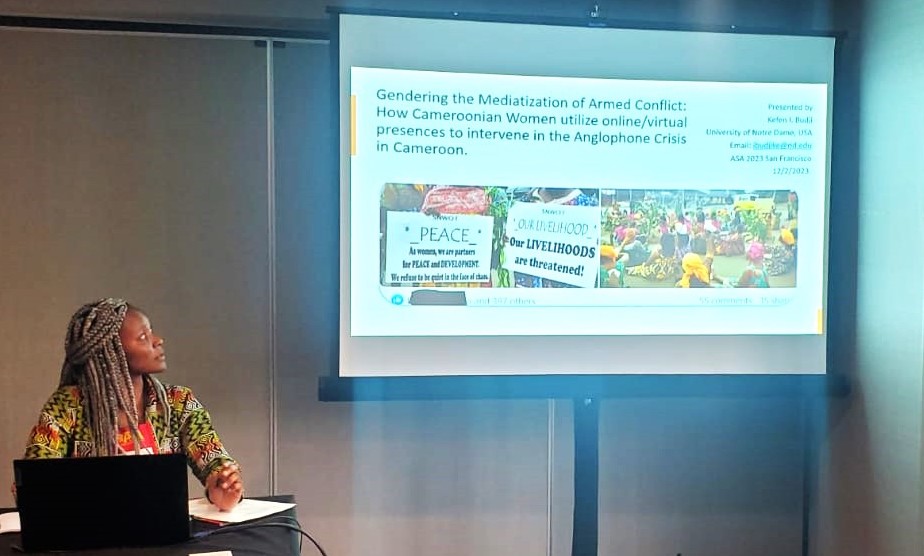African Studies Association (ASA) Annual Meeting; San Francisco, CA
Kellogg Institute Conference Travel Grants
Conference: 2023 African Studies Association (ASA) Annual Meeting; San Francisco, CA
November 30 – December 2, 2023
Presentation:“Gendering the Mediatization of Armed Conflict: How Cameroonian Women Utilize Online/Virtual Presences to Intervene in the Anglophone Crisis in Cameroon”
REPORT:
 From Nov 30 – Dec 02, 2023, sponsored by the Kellogg Conference Grant, I participated in the 66th Annual Meeting of the African Studies Association (ASA) in San Francisco, CA. Under the theme African Presences: envisioning Africa in Text and Deed, the conference brought together people from various countries interested and working in/on Africa and people of African descent. At the conference, I served as co-chair for a roundtable discussion titled Looking into the Future: Cameroon from a Regional and International Perspective, and as a presenter/ substitute chair at an Individual Paper Session – Virtual Mobilizations – composed of four papers focusing on different aspects of media and mobilization. My presentation was titled Gendering the Mediatization of Armed Conflict: how Cameroonian Women utilize Online/Virtual Presences to intervene in the Anglophone Crisis in Cameroon. I argued that through new communication technologies which effectively foster women’s mediatized (online/virtual) communication and interaction, Anglophone Cameroonian women transpose and challenge or subvert sociocultural understandings/ perceptions of womanhood in ‘safe spaces’, and through these actions access the public sphere and become more agentively involved in issues of conflict and peace.
From Nov 30 – Dec 02, 2023, sponsored by the Kellogg Conference Grant, I participated in the 66th Annual Meeting of the African Studies Association (ASA) in San Francisco, CA. Under the theme African Presences: envisioning Africa in Text and Deed, the conference brought together people from various countries interested and working in/on Africa and people of African descent. At the conference, I served as co-chair for a roundtable discussion titled Looking into the Future: Cameroon from a Regional and International Perspective, and as a presenter/ substitute chair at an Individual Paper Session – Virtual Mobilizations – composed of four papers focusing on different aspects of media and mobilization. My presentation was titled Gendering the Mediatization of Armed Conflict: how Cameroonian Women utilize Online/Virtual Presences to intervene in the Anglophone Crisis in Cameroon. I argued that through new communication technologies which effectively foster women’s mediatized (online/virtual) communication and interaction, Anglophone Cameroonian women transpose and challenge or subvert sociocultural understandings/ perceptions of womanhood in ‘safe spaces’, and through these actions access the public sphere and become more agentively involved in issues of conflict and peace.
The conference provided an avenue for me to share my work with a wide and diverse audience and receive valuable feedback, a process which helped to propel my voice as a black African woman scholar and embed it within wider conversations. Also, this process fostered my contribution to and learning from Africa-related knowledge. It further enhanced more critical thinking about my own work, its place in academia, and its possible implications for the broader public. Likewise, playing key roles in two almost distinct modes of presentation (roundtable discussion and paper panel) effectively honed my presentation, facilitation, and leadership skills. Furthermore, I partook in topical discussions within the North American Association of Scholars on Cameroon (NAASC) where we brainstormed how to collaborate more with one another and with scholars in Cameroon. This was extremely beneficial for me not just in terms of promoting discussions tailored towards my country, but also interacting and networking with others interested in issues pertaining to it. Similarly, I attended several other sessions, where I engaged in inter- and multidisciplinary discussions. These provided different lenses for thinking about my own work. Finally, I interacted with people in diverse fields within and beyond academia, thus creating valuable networks of cooperation for the present and future.
Moving forward, I plan to use insights from the conference to enrich my work as I write my dissertation and prepare an article on the topic to submit to a peer-reviewed journal. I also plan to keep strengthening the individual and group networks created at the conference. More specifically, I hope to become more involved in the work of the NAASC.








